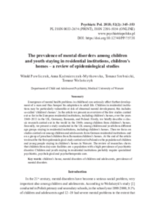Summary Emergence of mental health problems in childhood can seriously affect further development of a man and thus hamper his adaptation to adult life. Children in residential institutions may be particularly vulnerable at risk of abnormal mental development, this includes so-called ‘children’s homes’. In the article we present an overview of the few studies carried out so far in the European residential institutions, including children’s homes, over the years 1940–2011 in the UK, Germany, Romania, and Poland. Firstly, we briefly describe a classic research carried out in the world in the 1940s among children from children’s homes. Secondly, we present a study conducted in the UK among children and youth from different age groups staying in residential institutions, including children’s homes. Then we focus on studies carried out among children and adolescents form German residential institutions and on a group of preschool children from Romanian children’s homes. At the end of the article we describe the first epidemiological study carried out in Poland on the population of children and young people staying in children’s homes in Warsaw. The review of researches shows that children from day-care facilities are a population with a high prevalence of psychiatric disorder. Children and youth staying in residential institutions probably require specialized psychiatric, psychological and psychotherapeutic care.

